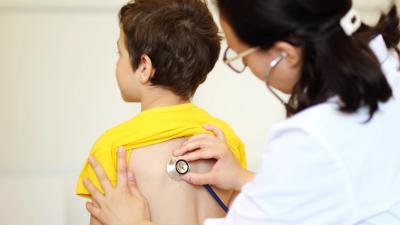Pneumonia

As pediatricians, we know how unsettling it can be when your child is sick. Fevers, coughs, and sniffles are part of childhood, but sometimes they can signal something more serious. Today, we want to talk about pneumonia—a word that can sound scary, but with the right information, we can face it together. Our goal is to equip you with the knowledge to recognize, prevent, and treat this common respiratory illness, so you can feel more confident and prepared.
What Exactly is Pneumonia?
At its simplest, pneumonia is an infection of the lungs. Normally, your child's airways and lungs are clear and open, allowing them to breathe easily. When pneumonia strikes, the tiny air sacs in the lungs (called alveoli) become inflamed and filled with fluid or pus. This makes it harder for oxygen to get into the bloodstream, leading to symptoms like coughing and shortness of breath. Think of it like a sponge that's been soaked with water, making it heavy and difficult to use.
What Causes It?
Pneumonia isn't just one single illness; it can be caused by various germs.
- Viruses: This is the most common cause of pneumonia in young children. Viruses like the flu, RSV (respiratory syncytial virus), and even the common cold virus can travel down into the lungs and cause an infection. Viral pneumonia is often less severe than bacterial pneumonia.
- Bacteria: Bacterial pneumonia can follow a viral illness or appear on its own. Common bacteria include Streptococcus pneumoniae and Mycoplasma pneumoniae. Bacterial pneumonia can sometimes have a more sudden onset and can be more severe.
- Fungi: Less common in healthy children, fungal pneumonia is more likely to occur in children with weakened immune systems.
What Are the Symptoms to Watch For?
Pneumonia symptoms can range from mild to severe and may develop gradually or suddenly. They often mimic other respiratory illnesses, so it's important to be vigilant.
- Persistent Cough: A cough that doesn't seem to get better, or one that produces mucus or phlegm.
- Fever: A high fever is a common sign, especially in bacterial pneumonia.
- Rapid or Difficult Breathing: This is a key symptom to watch for. Your child might breathe faster than usual, and you may notice their nostrils flaring or their chest "sucking in" with each breath.
- Chest Pain: This can be a sign of irritation in the chest area, especially when coughing or taking a deep breath.
- Shortness of Breath: Your child may seem out of breath even when resting.
- Fatigue or Low Energy: A child with pneumonia may seem unusually tired and have little interest in playing.
- Vomiting or Stomach Pain: Sometimes, these can be associated with the infection.
When to call your pediatrician: If you notice any of these symptoms, especially rapid breathing, high fever, or your child seems unusually ill, please don't hesitate to call our office. We are here to help you determine if an office visit or further care is needed.
How Can We Prevent Pneumonia?
While we can't prevent every illness, we can take steps to significantly reduce the risk of pneumonia.
- Vaccinations: This is the single most important tool we have. The pneumococcal vaccine (PCV13 or Prevnar 13) protects against the most common type of bacterial pneumonia. The flu shot is also crucial, as it prevents a viral illness that often leads to pneumonia. Make sure your child's immunizations are up-to-date.
- Good Hygiene: Simple habits make a huge difference. Teach your children to wash their hands frequently with soap and water, especially after coughing, sneezing, or playing outdoors. Remind them to cough or sneeze into their elbow, not their hands.
- Avoid Sick People: When possible, keep your child away from family members, friends, or other children who are clearly ill with a cold, flu, or other respiratory infection.
- Healthy Lifestyle: A strong immune system is a child's best defense. Ensure your child gets plenty of rest, a balanced diet with lots of fruits and vegetables, and regular physical activity.
Treatment: What to Expect
The treatment for pneumonia depends on the cause.
- Viral Pneumonia: Antibiotics are not effective against viruses. Treatment for viral pneumonia focuses on supportive care. This means helping your child feel more comfortable while their body fights the infection. This might include:
- Rest: Ensuring they get lots of sleep.
- Fluids: Encouraging them to drink plenty of water, broth, or juice to stay hydrated.
- Fever Reducers: Using over-the-counter fever reducers like acetaminophen or ibuprofen (following the correct dosage for their age and weight).
- Humidifier: Using a cool-mist humidifier can help ease coughing and make breathing more comfortable.
- Bacterial Pneumonia: If we suspect a bacterial infection, we will likely prescribe an antibiotic. It is critically important to ensure your child takes the full course of the medication, even if they start feeling better. Stopping early can lead to the infection returning and becoming resistant to the medicine.
In some cases, especially with severe symptoms, hospitalization may be necessary to provide oxygen therapy or IV fluids. This is not a cause for panic, but a way to ensure your child gets the best care possible.
Pneumonia is a serious illness, but with awareness, prevention, and prompt medical care, most children make a full recovery. As your child's pediatrician, we are your partner in this journey. Never hesitate to call with your questions or concerns—no matter how small they may seem. Your instincts are your most valuable tool, and together, we can keep your child healthy and happy
